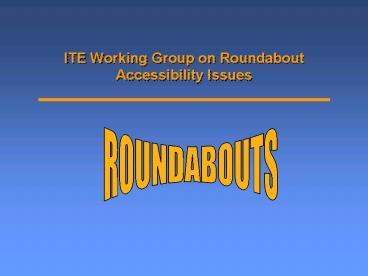ITE Working Group on Roundabout Accessibility Issues - PowerPoint PPT Presentation
1 / 35
Title:
ITE Working Group on Roundabout Accessibility Issues
Description:
ITE Working Group on Roundabout Accessibility Issues – PowerPoint PPT presentation
Number of Views:40
Avg rating:3.0/5.0
Title: ITE Working Group on Roundabout Accessibility Issues
1
ITE Working Group on Roundabout Accessibility
Issues
ROUNDABOUTS
2
A roundabout...
- is an intersection with a generally circular
shape. - requires all entering traffic to yield to
circulating traffic. - has appropriate geometric features to ensure
slow entering and circulating speeds.
3
Roundabouts are a subset of circular
intersections
All circularintersections
Roundabouts
Others
Rotaries
Neighborhoodtraffic circles
4
Conversion of Rotary to RoundaboutKingston, NY
Photo New York State DOT
5
Key Roundabout Features
Exhibit 1-1, p. 6
6
Roundabouts versus Traffic Circles
- Five key elements distinguish roundabouts
- YIELD control on entry
- Priority to circulating vehicles
- Pedestrian access crossing
- Parking
- Direction of circulation
7
Speed Reduction
8
Speed Reduction
Little Deflection
Adequate Deflection
Photos Lee Rodegerdts
9
Settings
- Mini-roundabouts
- Urban compact
- Urban single-lane
- Urban double-lane
- Rural single-lane
- Rural double-lane
10
Mini-Roundabout ExamplesGermany
Photos Werner Brilon
11
Urban Compact RoundaboutGermany
Photo Werner Brilon
12
Urban Single-Lane RoundaboutBend, OR
Photo Oregon DOT
13
Urban Double-Lane RoundaboutClearwater, FL
Photo Bruce Robinson
14
Urban Multi-Lane RoundaboutAvon, CO
Photo Lee Rodegerdts
15
Rural Single-Lane RoundaboutLeeds, MD
Photo Maryland SHA
Photo Lee Rodegerdts
16
Rural Double-Lane Roundabout Examples
Taneytown, MD
Photo Lee Rodegerdts
Photo Austroads
Australia
Photo Eenheid in Rotondes, CROW
Utrecht Province, The Netherlands
17
Typical Settings and Reasons for Implementation
- Community Enhancements
- Traffic Calming
- Safety Improvements
- Operational Improvements
- Special Situations
18
Community Enhancements
Located in areas where capacity and safety are
not key issues
Photo Lee Rodegerdts
Photo Joe Bared
France
Naples, FL
19
Traffic Calming
Used for speed control in neighborhoods
Photo Lee Rodegerdts
Naples, FL
20
Geography
- International
- - 50,000
- - 15,000 in the UK and France
- US
- - 252 minimum
- - likely more than 500
21
252 US Roundabouts
- 174 (69) single lanes
- 56 (22) are multi-lane
- 22 (9) unknown
22
A brief history of roundabouts
1997 Added to HCM
1905 Columbus Circle in NYC
1990 First modern use in U.S.
1966 Mandatory give-way rule adopted in
UKFirst modern use in UK
1900
1950
2000
1970s First modern use in France, Australia
1920s-1950s Rotaries built in U.S.
1980s First modern use in Germany
2000 FHWAs ROUNDABOUTS An Informational Guide
23
NCHRP Synthesis 264 (Jacquemart)
Before Construction
After Construction
24
ITE Journal, Sept. 2002 (Retting, et al.) Survey
in KS, MD, and NV
Before Construction
After Construction
25
Pedestrian / ADA Issues
- Positives
- Speed-controlled environment
- Splitter island provides refuge
- Negatives
- Pedestrians must assess gaps
- Disabled, children, and elderly may have
difficulty - Entries and exits with more than one lane are
difficult to cross
26
Pedestrians
- General Principles
- Discourage use of central island
- Crossing set back from the yield line
- Splitter islands
- Perpendicular crossings
27
Visually Impaired Pedestrians
- Navigation tasks
- Locating the crosswalk
- Listening for a safe gap
- Splitter island pedestrian refuge
- Locating the correct path after the crossing
28
Pedestrian Crossing Design
Exhibit 6-26, p. 157
29
Sidewalk Design
Exhibit 6-40, p. 169
30
PedestriansEurope
Source Werner Brilon
31
PedestriansAnnapolis, MD
Photo Ed Myers
32
Multi-modal TreatmentsThe Netherlands
Separate bicycle track/path
Good Solution safe higher volumes
Source Rotondes - CROW
33
Multi-modal TreatmentsThe Netherlands
Ped/Bike Priority (urban areas)
Vehicle Priority (rural areas)
Source Eenheid in Rotondes - CROW
34
Visually Impaired Pedestrians
- Design Guidance
- Optimal location of crosswalk
- Optimal orientation of crosswalk
- Application of textured pavements
- Raised crosswalks
- Traffic Control
- Other guidance issues
35
Visually Impaired Pedestrians
- Technological Advancements
- Flashing beacons
- Raised Crosswalks
- In-pavement flashers
- Pedestrian signals (midblock, actuated, ped
activated) - WMU research




















![Steps to Fix QuickBooks File Doctor are Not Working Error? [Solutions Tips] PowerPoint PPT Presentation](https://s3.amazonaws.com/images.powershow.com/9154436.th0.jpg?_=20181005056)










